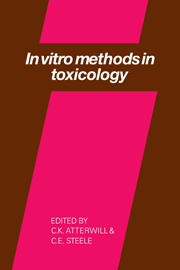Book contents
- Frontmatter
- Contents
- List of contributors
- Preface
- Introduction
- TARGET ORGAN TOXICITY
- GENERAL AND TOPICAL TOXICITY
- REPRODUCTIVE TOXICITY
- An in vitro test for teratogens using cultures of rat embryo cells
- Postimplantation embryo culture and its application to problems in teratology
- Sub-mammalian and sub-vertebrate models in teratogenicity screening
- The use of in vitro techniques to investigate the action of testicular toxicants
- An in vitro assessment of ovarian function: a potential tool for investigating mechanisms of toxicity in the ovary
- CONCLUSION
- Index
Postimplantation embryo culture and its application to problems in teratology
Published online by Cambridge University Press: 06 August 2010
- Frontmatter
- Contents
- List of contributors
- Preface
- Introduction
- TARGET ORGAN TOXICITY
- GENERAL AND TOPICAL TOXICITY
- REPRODUCTIVE TOXICITY
- An in vitro test for teratogens using cultures of rat embryo cells
- Postimplantation embryo culture and its application to problems in teratology
- Sub-mammalian and sub-vertebrate models in teratogenicity screening
- The use of in vitro techniques to investigate the action of testicular toxicants
- An in vitro assessment of ovarian function: a potential tool for investigating mechanisms of toxicity in the ovary
- CONCLUSION
- Index
Summary
INTRODUCTION
Techniques for the culture of postimplantation mammalian embryos have been developed for embryos explanted between the early primitive-streak stage (8th day of gestation in the rat - Buckley et al 1978) and 55 somite stage (14th day in the rat - Cockroft 1973), though the best results are obtained with embryos explanted at the head-fold or early somite stage (New et al 1976 a, b; Sadler 1979; Sadler & New 1981). These techniques are now widely used in academic research, and increasingly in contract laboratories and pharmaceutical toxicology departments.
Static culture systems may be used for the younger embryos, but will only support limited development (Tarn & Snow 1980). Systems in which oxygenated medium is made to flow past embryos anchored in a culture chamber give better results (e.g. New 1967), but are relatively costly and time consuming. In much teratological testing, it is desirable to be able to culture large numbers of embryos through the major period of organogenesis with minimum fuss, and for this purpose rotating bottle cultures, which may be intermittently or continuously gassed, are most suitable.
The area of teratological testing for which in vitro methods may be of greatest potential benefit is for the further investigation of substances which in vivo tests have shown to be of toxicological interest. Growing embryos outside the mother provides opportunities to study the direct action of a teratogen or its metabolites free of the mediating effects of maternal pharmacokinetics.
Information
- Type
- Chapter
- Information
- In Vitro Methods in Toxicology , pp. 365 - 390Publisher: Cambridge University PressPrint publication year: 1987
Accessibility standard: Unknown
Why this information is here
This section outlines the accessibility features of this content - including support for screen readers, full keyboard navigation and high-contrast display options. This may not be relevant for you.Accessibility Information
- 4
- Cited by
